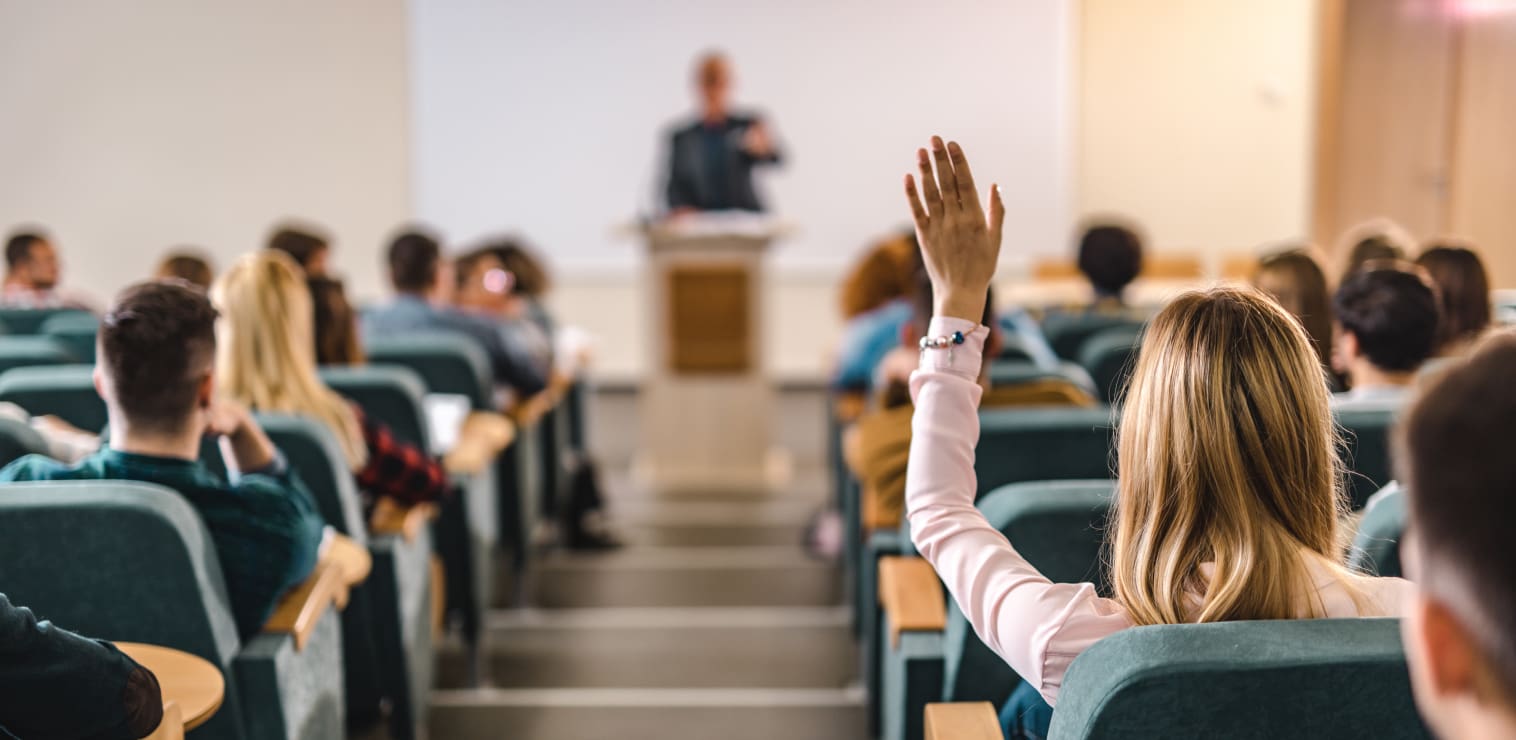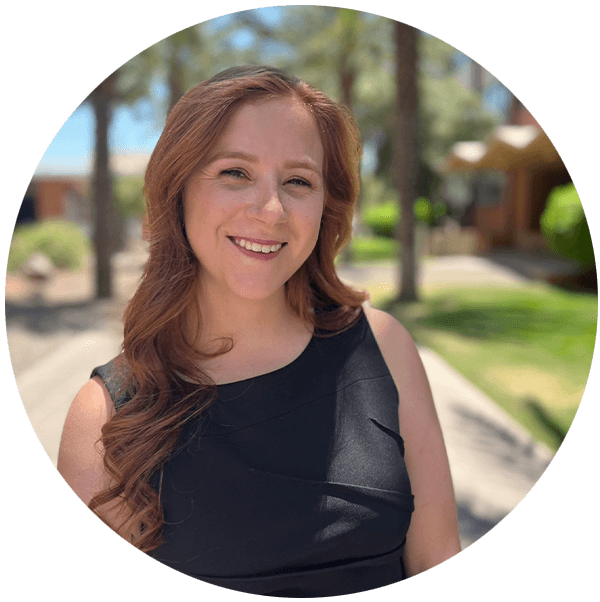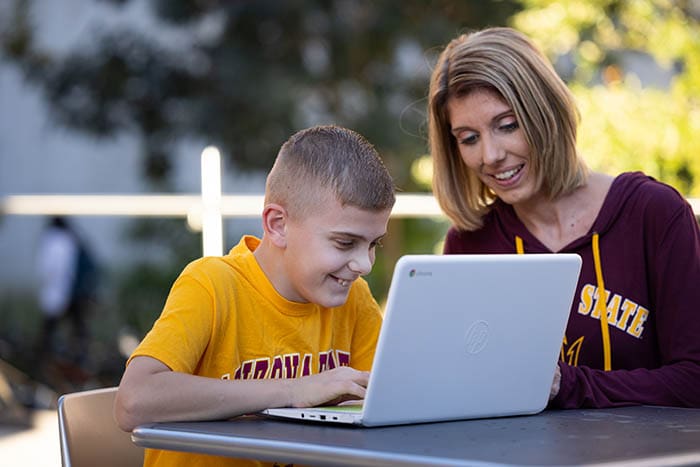-
Blended & Personalized Learning
Blended learning integrates in-person instruction with digital tools, while personalized learning environments empower students to achieve mastery at their own pace through adaptive strategies that accommodate diverse learning styles.
- Blended learning models (station rotation, flipped classroom, playlist model, etc.)
- Personalizing learning through student goal-setting, pacing, pathways, and differentiation
- Supporting learner ownership and agency
-
Mastery-Based Learning
Mastery-based learning prioritizes student understanding and proficiency, advancing learners to the next level only upon mastering current material, fostering a personalized and flexible pace that empowers students to take control of their educational journey for deeper understanding and inclusivity.
- Breaking down essential learning outcomes
- Measuring knowledge and understanding
- Deepening student mastery through rigorous learning
-
Creative & Authentic Assessments
Creative and authentic assessments in education, utilizing diverse formats like projects and multimedia presentations, encourage students to showcase understanding through real-world applications, cultivating crucial skills for success in today’s multifaceted world.
- Using mediums to design and create assessments
- Boosting higher order thinking skills
- Integrating student choice and alternative assessments
-
Project-Based Learning
In project-based learning, students acquire knowledge and skills through hands-on projects, fostering critical thinking, problem-solving, and creativity while preparing them for the modern workforce through practical application and teamwork.
- Working collaboratively with colleagues to design a multi-week project
- How to target essential questions and critical mini-lessons
- Student-driven questions and products
-
Collaborative & Conceptual Learning in Math
Collaborative and conceptual math learning transforms traditional instruction by emphasizing teamwork, fostering a cooperative environment through group activities and discussions, and enhancing problem-solving and critical thinking skills with a focus on conceptual mastery over procedural memorization.
- Strategies to engage students
- Inquiry-based learning to discover math principles
- Fostering a growth mindset in the math classroom
Prep for a better career
Welcome to the ASU Prep career page, where you’ll find the latest job openings and all the benefits of joining our team. We are always looking for passionate professionals who want to make a difference in the lives of students.
We believe investing in people creates a culture where students thrive.
Put students first – even when it’s hard
Create relationships that matter
Speak up when improvement is possible
Meet students where they are
Bring your whole self to the classroom
Collaborate compassionately
Disrupt traditional education
Seek varied perspectives
Personalize learning for every student
Remove barriers to learning

Learn how tuition reimbursement can help you earn a Masters Degree or PhD.
We believe transforming education is our only path to success.
ASU Prep Academy is a K-12 charter school network with a shared mission to design new models for educational success and raise academic achievement for all learners. Our school models include traditional in-person instruction, a fully digital experience and hybrid programs that combine the best of both.

What we do for teachers & staff
- Encourage innovation and empower local decision making
- Provide ongoing professional development
- Create communities of peer support
- Provide the latest technology tools

What we do for students
- Personalize learning
- Offer flexible school models
- Provide the opportunity to earn college credit
- Encourage exploration of college and careers
We believe varied viewpoints spark innovation.
Global impact is a lofty goal. To achieve that we need to recruit a varied team where all cultures and viewpoints are not just included, but valued equally.

I enjoy working for our amazing organization because everyone has a seat at the Global Academy @ ASU Prep. One of the tenets of our school is ensuring that we focus our efforts more on who we include and not making anyone feel excluded.
””—Nicola Homy M.Ed
Middle School Learning Success Coach
We believe opportunity inspires excellence.

ASU Prep benefits include:
- Tuition Reimbursement
Generous tuition reimbursement for employees and spouses and discounts for dependents at ASU, NAU, and UA.
- Healthcare
Employer-paid premium healthcare plans through Aetna.
- Retirement
Access to AZ State Retirement System (A.S.R.S.) with employer-matched contributions.
- Career Development
15+ professional development days for teachers, plus mentoring by ASU professors, and teacher mentors on site.
- And more
Paid time off and holidays, exclusive wellness programs, and no waiting list to enroll dependents into ASU Prep.
Expert Teacher Tracks
ASU Prep is investing in teachers by offering five professional development tracks where they can develop expertise in a student-centered topic. Teachers engage in a year-long course and implement strategies they have learned directly into their classroom. Upon passing the course, they will earn a two-year, renewable stipend of $1,500 and be recognized as an expert in that area, opening up their classroom to visitors and also assisting site leaders and their colleagues with continued professional learning.

Transformational Teacher Leaders
ASU Prep Transformational Teacher Leaders (TTL) embody the ASU Prep mission and core values, lead by example, make data and research-based decisions, implement innovative techniques, take risks, and foster collaboration throughout the entire school community.
In this teacher leadership role, TTLs will be both teachers and leaders, allowing us to keep our best teachers in the classroom but giving them opportunities to rise as instructional leaders on their campuses. Teachers who love teaching but are seeking more responsibility can have the best of both worlds in this advancement track.
Prep Leadership Academy
Prep Leadership Academy, or PLA for short, is a two-year leadership development program designed for individuals who are committee to ASU Prep, have at least one year of service to the organization, and who have the desire to be prepared for promotions in the future. Participants engage in book studies, a speaker series and individualized career mapping and mentoring.

Being part of Prep Leadership Academy (PLA) was an incredible experience that expanded my leadership skills and deepened my commitment to ASU Prep. The mentoring was invaluable and prepared me for future opportunities.
””—Katie Van Deinse
Assistant Director of Admin Services and 2024 Prep Leadership Academy Graduate
Starting Salaries
Instruction
Average teacher salary for Digital/Immersion 23-24: $59,972.88
While the above reflects average salary, please know that this offer does not include our entire benefits package. Notably, this calculation does not include the annual 301 payment for eligible roles. ASU Prep’s maximum payout for 301 is currently $5,000.
Teaching Intern
$22,500
n/a
No
n/a
Teaching Resident
$45,000
10 Month
No
Actively enrolled in an EPP
Teacher
$50,000
10 Month
Yes
Yes
Personalized Learning Advisor
$52,500
10 Month
Yes
Preferred
SPED Teacher
$60,000
10 Month
Yes
Yes
SPED Teacher
$65,000
11 Month
Yes
Yes
Teacher
$57,500
11 Month
Yes
Yes
Khan World School Guide
$57,500
12 Month
Yes
Yes
Instructional Support
While the above reflects average salary, please know that this offer does not include our entire benefits package. Notably, this calculation does not include the annual 301 payment for eligible roles. ASU Prep’s maximum payout for 301 is currently $5,000.
Speech Language Pathologist Assistant
$50,000
10 Month
No
Yes
Learning Success Coach
$50,000
10 Month
Yes
Yes
Counselor, Math/Reading Interventionist, Social Worker
$52,500
10 Month
Yes
Yes
Academic Coach
$52,500
10 Month
Yes
Preferred
Speech Language Pathologist
$70,000
10 Month
Yes
Yes
OT, Psychologist
$60,000
10 Month
Yes
Yes
Social Worker
$57,500
11 Month
Yes
Yes
Math/Reading Interventionist
$60,000
11 Month
Yes
Yes
Psychologist
$65,000
11 Month
Yes
Yes
Learning Success Coach
$55,000
12 Month
Yes
Yes
Gifted Specialist
$57,500
12 Month
Yes
Yes
Physical Therapist
$36/hr
n/a
Yes
Yes
Staff
Paraprofessional
$14/hr
n/a
No
Preferred
Psychologist Assistant, Attendance Clerk, Health Assistant, Receptionist. Learning Facilitator, SPED Paraprofessional, Classroom Intern, Club Poly Assistant, Parent Liaison
$15/hr
n/a
No
n/a
Registrar, Digital Learning Facilitator
$16/hr
n/a
No
n/a
IT Campus Technician
$18/hr
n/a
No
n/a
Certified Occupational Therapy Assistant
$19/hr
n/a
No
Yes
Club Poly Coordinator
$19/hr
n/a
No
n/a
Security Officer
$20/hr
n/a
No
n/a
Administrative Assistant
$37,500
n/a
No
n/a
Registered Nurse
$55,000
Yes
No
Yes
Administrators
Dean of Students
$50,000
10 Month
Yes
n/a
Assistant Principal
$70,000
11 Month
No
Yes
Assistant Principal
$75,000
12 Month
No
Yes
Principal
$85,000
12 Month
No
Yes
Added Compensation / Stipend
Bachelors
Max 1 degree, for roles in which it isn’t required
$1,000
$0.50
Masters
Max 1 degree, for roles in which it isn’t required
$1,000
$0.50
Doctorate
Max 1 degree
$1,000
$0.50
TIF
Teaching Science, Math
$2,000
n/a
National Board Certification
$3,000
n/a
Coaching
$1200/semester
n/a
Athletic Director
$1500/semester
n/a
Clubs
$250/quarter
n/a

ASU Charter
ASU is a comprehensive public research university, measured not by whom it excludes, but by whom it includes and how they succeed; advancing research and discovery of public value; and assuming fundamental responsibility for the economic, social, cultural and overall health of the communities it serves.
